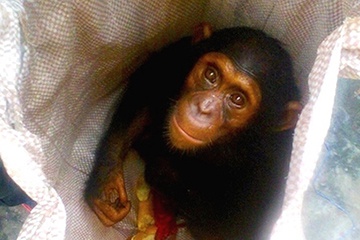It’s Time to End the Commercial Trade of Wildlife
by Gregg Tully, PASA Executive Director
As I write this, PASA’s 23 members continue to provide care for over 3,000 great apes and monkeys every day, even as the COVID-19 pandemic has changed everything about their operations. They no longer have volunteers to help out. Their supply chains are disrupted, so it’s much harder to get everything from veterinary supplies to food to clean water. Many have staff sheltering in place – for nearly three months in some cases – just so they can maintain normal care for the chimpanzees, gorillas, drills, vervets, bonobos and other amazing primates.
Many of these animals came to PASA member sanctuaries as victims of wildlife trafficking. Indeed, as noted in this commentary that I had the honor to co-author with Jane Goodall, the trade in wildlife is a scourge. Tragically, the pandemic has made it worse. Poachers, no longer fearing ranger patrols and knowing that visitors won’t be coming to closed parks, sanctuaries and reserves, are increasingly bold in their efforts.

The commercial wildlife trade threatens many primates, including chimpanzees.
That is why we at PASA have decided it’s time to take a stand against commercial wildlife trade. For any reason. Period. Hard stop.
As an alliance of wildlife centers, we debated the issue among our members. There were many different opinions expressed. But in the end, this statement reflects what we believe and what we as an organization are committed to – wildlife conservation. This is our north star, through disease (COVID-19 isn’t the first to disrupt our members’ operations), civil unrest, habitat loss, and all the other challenges we face in protecting these inspiring animals.
As an alliance, too, we recognize that this is a complex and multi-faceted challenge to tackle. It’s going to take all of us working together – and help from supporters like you will be essential. Change is never easy, but some seasons call for it. We’re in such a season right now.
Finally, we know, as an alliance, that transformation is possible. Our members witness it each day, with every animal they rescue. It looks like a baby bonobo’s first laughter. Or a chimpanzee, who saw its mother killed, now chasing his friends as he gets settled into a new social group. PASA is proud to be part of this life-giving process.
But now it’s time to stand up for more. I hope you’ll read the statement and be inspired to join us.
Below is the full statement.
The COVID-19 pandemic, a result of widespread transmission of the SARS-COV-2 virus, has brought the commercial trade of wild animals into sharp and painful focus. While the initial human source has not been conclusively identified, it is widely believed that the outbreak is the result of transmission from wildlife to humans through the interface of a market selling a variety of wild animals housed in close quarters, both alive and dead, for human consumption.
The Pan African Sanctuary Alliance (PASA), the largest association of wildlife centers in Africa, opposes the commercial trade in wild animals for any reason, including human consumption, use in research, as entertainment, or as pets. As an alliance of wildlife sanctuaries, we stand unequivocally on the side of wildlife conservation. Between the burgeoning human population and shrinking forests, no knowledgeable person could argue that Africa’s commercial trade in wild animals is sustainable. It is not. Further, it represents an existential threat to wildlife and a critical risk to healthy ecosystems.
We understand the complexity of the challenge presented by the sale of wild animals, which includes organized crime syndicates, live and online marketplaces, and global supply chains. For that reason, we advocate a multi-level approach to addressing this issue, one which balances human needs with both animal welfare and biodiversity conservation interests.
- At the local level, we advocate that municipalities:
a. prohibit the sale of wildlife in both live markets and online.
b. foster partnerships between communities and NGOs to create alternative livelihoods and community development.
c. facilitate community practices to prevent zoonotic disease transmission. - At the national level, we advocate that governments:
a. develop enforceable regulations that help prevent zoonotic disease transmission.
b. enact adequate legislation addressing illegal wildlife trade and provide training on the enforcement of these laws.
c. empower law enforcement agencies to prosecute traffickers to the full extent of the law.
d. secure habitat from human encroachment and provide adequate support for the protection of wild land. - At the international level, we advocate that countries:
a. develop regional and international coalitions to preserve habitat and protect species which cross national boundaries.
b. reevaluate and strengthen international treaties which govern the protection of animals.
c. strengthen security in international airports to intercept and ultimately prevent the bushmeat trade.
d. partner with technology companies to close down illegal online markets for wildlife.
We believe the commercial trade in wild animals must end to preserve endangered species and as a matter of public health. Experts warn that more pandemics will follow in the trail of SARS, MERS, Ebola and now COVID-19 if we do not take greater care in how we cohabitate with the animals who share this planet with us. This can be done in a humane spirit of innovation that provides new opportunities for human growth and development while securing a future for wild animals.
